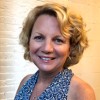
When and how did you join the development field? What path brought you to your current role?
I joined the field right after college as an assistant to two major gift officers in the development office at Harvard University. Then I did research and annual giving at the Harvard T. H. Chan School of Public Health, and leadership and principal giving in management and campaign roles at Wellesley and Wheaton Colleges. All along, I planned to switch gears at some point and go into fundraising for human services. My opportunity came when I met Maggie Burns, VP for Philanthropy at St. Francis House, at a networking breakfast in the summer of 2019.
Is there someone who has shaped or influenced your career in development? If so, in what way?
I’ve been fortunate to learn from many amazing mentors: Sue Paresky taught me a lot about development in general as someone new to the field in the early 1990s at Harvard, Sue Rapple taught me all about major gift fundraising (also at Harvard), Mary Casey taught me about management and leadership at Wheaton College, Marisa Jaffe taught me everything I know about principal gift fundraising, and Cameran Mason and Kimberly Hokanson taught me about teamwork at Wellesley College. Currently I am learning a lot about fundraising for human services from Maggie Burns, our VP, and Karen LaFrazia, President and CEO of St. Francis House, who are an unbelievably talented and effective campaign fundraising duo!
Tell us a bit about the organization for which you currently work and why fundraising is important to the mission?
St. Francis House’s mission is to help rebuild lives for people experiencing poverty and homelessness in Greater Boston.
So we’re incredibly multi-faceted: we serve daily hot meals, offer showers, distribute clothing, and meet lots of other immediate needs of our 500+ daily guests, including hosting a free medical clinic onsite, run by Boston Health Care for the Homeless. Our guests can even get their mail delivered here, get access to phones and computers, or paint, weave, and engage in other creative pursuits in our expressive art therapy program. For women, we have a special space and programming targeted for this particularly vulnerable population.
St. Francis House also offers our guests help with longer-term solutions to homelessness: We provide job and life skills training programs, run an active recovery support center, operate 100 units of permanent supportive housing with many more units planned, and increasingly, help more and more people find and retain housing in the Greater Boston area.
Looking to the future, we plan to renovate several floors of our 100-year-old building to better serve the 6,000+ guests we serve annually, and we will open a much-needed Intensive Outpatient Treatment Center for substance use disorder this year. Quite simply, none of this would be possible without private support – a top-notch development team is essential to the agency’s existence.
Why did you join WIDGB? How has the WIDGB community supported you either throughout the pandemic or before?
I joined WIDGB because -- especially working in a smaller development office – I love the ability to tap so much wisdom and experience through the membership and events. We all were wondering how to do our jobs in this pandemic, and we have leaned on each other for ideas and validation. The support from WIDGB through this crisis has been huge.
Describe your biggest development success story to date Or Can you share with us an inspiring development story from your career?
St. Francis House recently received its largest gift ever, and there are so many reasons for this. We have such a strong team, great program staff who really deliver on the mission, and terrific, visionary leadership. However, I would like to think that my work here in launching a formal principal gift program for the agency is one factor that led to this gift.
How do you incorporate principles of DEI into your development work? Or Share with us a DEI priority or principle from your organization that particularly inspires you and why.
At St. Francis House, we respect the lived experiences of our guests and let them tell us how best to help them. In the same way, in development internally and externally, it is important to understand and respect the lived experiences of those we work with, in order to ensure that everyone can fulfill their true potential.
What advice would you offer to someone new in the field of development?
Join WIDGB and participate in its programs! The connections you make will be invaluable.

